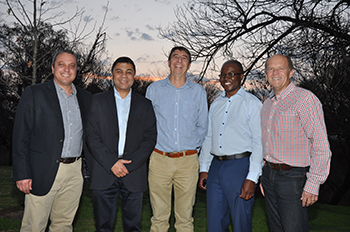Latest News Archive
Please select Category, Year, and then Month to display items
19 November 2018
|
Story Charlene Stanley
|
Photo Charlene Stanley
 Prof John Mubangizi, Dean of the Faculty of Law, encouraged delegates at the Fifth Annual International Mercantile Conference to share ideas on best international practice in their various fields.
Prof John Mubangizi, Dean of the Faculty of Law, encouraged delegates at the Fifth Annual International Mercantile Conference to share ideas on best international practice in their various fields.
“Don’t say anything online that you wouldn’t want plastered on a billboard with your face on it.”
This famous quote by international tech expert Erin Bury should be a guiding light when it comes to online habits in the workplace, according to Francois Cilliers, UFS Lecturer in Mercantile Law.
In his presentation Could Social Media be the Gateway to Employment Discrimination? he warned that employees have a responsibility not to bring their employers in disrepute through their comments on social media.
“Posts, updates, tweets, and comments are considered to be publications and can therefore never be seen as privileged information,” he explained.
Responsibility on employees and employers alike
He pointed out that employers also had a responsibility regarding the way in which they use the information about prospective employees obtained via social media.
“Nowadays, approximately 75% of companies hire through social media. In the US, recruiting companies spend hours researching candidates, making full use of what they can find on social media. It was found that 50–80% of employers frowned upon posts and pictures featuring drug and alcohol abuse, profanity, and bad grammar.”
He warned that employers needed to tread lightly, as a decision not to employ someone as a result of information on the prospective employee’s political views and sexual orientation could constitute unfair discrimination as set out in the Employment Equity Act.
“An employer who wishes to use a screening process (utilising social media) has to prove that the information and the process is objectively necessary and can be justified with reference to the inherent requirements of the job,” he explained.
“As technology and electronic systems advance, so too should the applicable labour laws.”
Cilliers’ presentation formed part of the Fifth Annual International Mercantile Law Conference recently hosted by the Faculty of Law on the Bloemfontein Campus.
Incorporating new technology in teaching and research
“This conference is an opportunity to share ideas on best practice in what is perceived as a ‘difficult’ field within Law,” said Prof John Mubangizi, Dean of the Faculty of Law, as he opened the proceedings. Topics in the discussion sessions ranged from Racism in the workplace and The underrepresentation of females in the judiciary, to Decriminalisation of cannabis: A recipe for healthy employer-employee relations?
“Conferences such as these help us to take advantage of the newest developments in technology to advance our teaching and research,” said Prof Mubangizi.
“To quote Einstein: ‘We can’t solve problems by using the same kind of thinking we used when we created them.’”
UFS hosts the 2017 SAIMS Conference
2017-09-21

The hosts of the 2017 SAIMS conference:
Dr Jacques Nel
(UFS:Business Management), Prof Francis Petersen
(UFS Rector and Vice-Chancellor),
Dr Werner Vermeulen (HOD of UFS: Business Management),
Dr Habofanwe Koloba (UFS: Business Management),
and Prof Hendri Kroukamp
(UFS: Dean of Economic and Management Sciences).
Photo: Supplied
The University of the Free State’s (UFS) Department of Business Management recently hosted the 29th South African Institute of Management Scientists (SAIMS) conference at Kopano Nokeng in Bloemfontein. This year’s theme, ‘Management Research: Science Serving Practice’ focused on the importance of sharing our results and making it relevant and usable to different communities.
Prof Petersen motivates researchers to become part of the business cycle
On the first day of the conference, the Rector and Vice-Chancellor of the UFS, Prof Francis Peterson, welcomed 148 delegates from 18 different institutions (academic and professional) to the City of Roses. He motivated them to keep on doing highly scholarly research by being part of the business cycles.
Prof Adré Schreuder, founder of Consulta (Pty) Ltd, was the keynote speaker of the conference. He highlighted four personas needed to further enhance and develop the science-practice alignment in market research and business. “The first skills persona is called a Social Media Maven, which is in line with the rapid growth of social media networks and the growing need for social media analytics. Then there is the Data Synthesiser that supports the growth trend in Big Data and Advanced analytics, which are both driven by technological innovation and the enormous volume of available data. The third one is Marketing Strategist, which has strong representation in brand and advertising research in our industry. Lastly, we have the ‘Business Consultant’ which aligns with the industry trends towards deeper insights and consultative skills required to move beyond mere reporting, but rather getting involved in the design and implementation of recommendations.”
Conference to collaborate academics and business
Dr Werner Vermeulen, SAIMS 2017 Conference Chair, says, “This conference will underpin the need for collaboration and cooperation of individuals from the academic environment and the business world itself.” He says the conference will also provide a wonderful forum to refresh knowledge and explore contemporary trends and future-based business research.
Delegates were also given the opportunity to dress up to the carnival theme and were entertained by a fire dancer and magician. They had the honour of indulging in two Kovsie-produced food products, the St Dairy organic cheese and exotic mushrooms by Mushroom House.